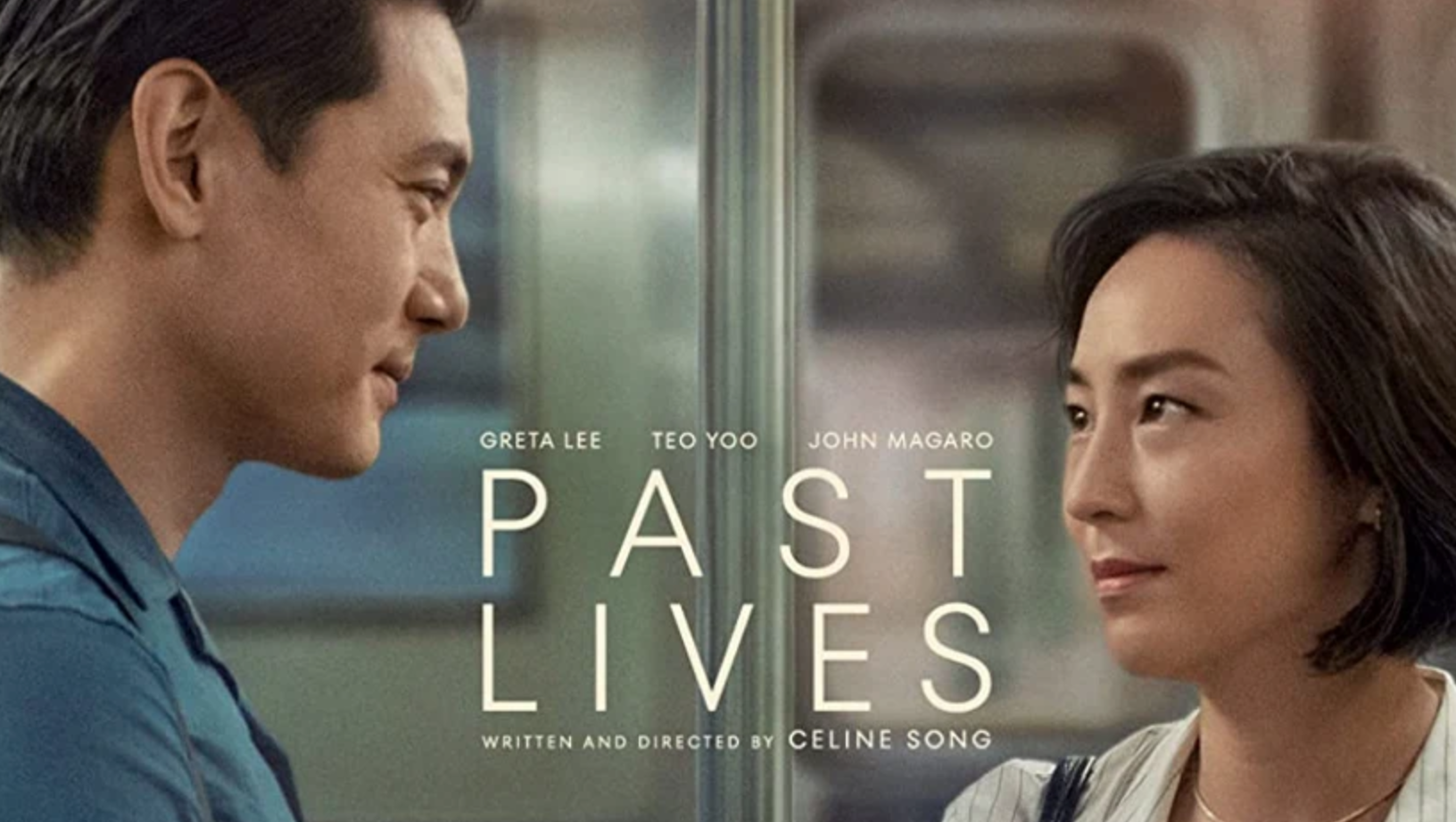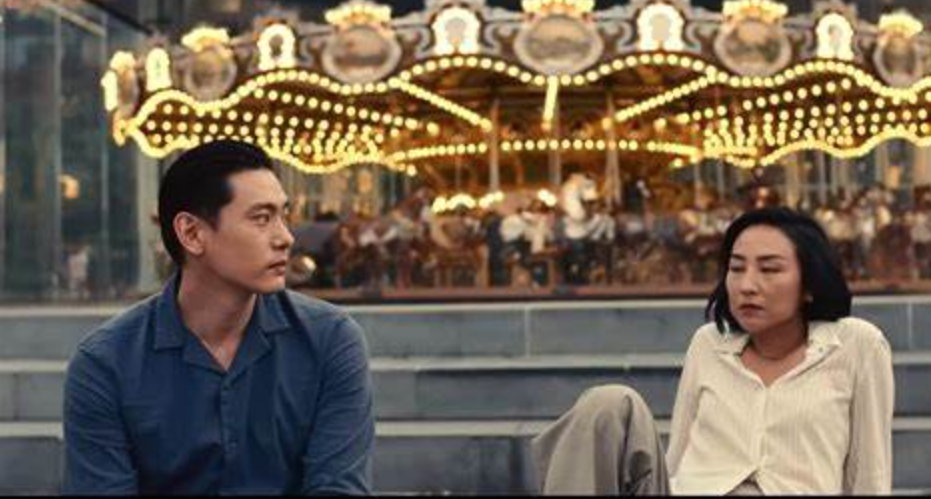In Past Lives, director Celine Song presents a poignant and nuanced look at love, destiny, and identity across time and space. The film captures a rare, quiet brilliance that resonates deeply with audiences, largely due to its patient storytelling, masterful direction, and superb acting. Past Lives has received considerable acclaim for its emotionally intelligent approach to a cross-cultural, cross-time love story that reflects the universal longing for connection and understanding.
Past Lives follows Nora (Greta Lee) and Hae Sung (Teo Yoo), childhood friends from South Korea who are separated when Nora’s family emigrates to Canada. Years later, as adults, they reconnect online and are immediately reminded of their deep bond. Although their reunion is virtual, it becomes clear that the affection and connection between them have endured.
Now living in New York, Nora is married to Arthur (John Magaro), a writer who finds himself caught in the emotional tide of Nora and Hae Sung’s renewed connection. The film delicately explores the three-way relationship without veering into melodrama, highlighting the themes of fate, personal history, and the paths not taken.
Themes of Love and Destiny
The concept of “In-Yun,” a Korean belief that people’s lives are intertwined through connections formed over many lifetimes, plays a significant role in the film. It suggests that our relationships are the result of cosmic forces, creating an atmosphere of romanticism and fated connections that permeates the narrative. Song uses In-Yun not only to add depth to Nora and Hae Sung’s bond but also as a lens through which the audience can view their own relationships. The film subtly invites viewers to contemplate the forces at play in their lives and the people with whom they share such “past lives.”

Nora’s life in New York, with her husband Arthur, is marked by modernity and forward momentum. Hae Sung, on the other hand, represents Nora’s past and the person she might have been if she had stayed in Korea. Song creates a delicate balance, portraying Hae Sung as both familiar and foreign to Nora. Their interactions are filled with longing but tempered by the quiet sadness of knowing they inhabit different worlds. This juxtaposition of modern American life with a nostalgic, almost mythological connection to Korean culture adds a layer of complexity to Nora’s journey of self-discovery.
Character Development and Performances
Greta Lee delivers an unforgettable performance as Nora, bringing an emotional subtlety that anchors the film. She portrays Nora’s internal struggle beautifully, conveying the nuances of a woman torn between the life she’s built and the path she left behind. Her chemistry with Teo Yoo is palpable, filled with unspoken emotions and bittersweet tension. Yoo’s portrayal of Hae Sung adds another layer to the story—his character is quietly earnest, grounding Nora with a sense of home and familiarity she rarely experiences in New York.
John Magaro, as Arthur, offers a compassionate portrayal of a man who understands that his wife’s connection to her past does not negate her love for him. Arthur’s awareness and acceptance add a layer of maturity and realism to the story, showing that love can be both complex and accepting. This dynamic makes Past Lives more than just a romantic drama; it’s a study of human relationships and how people come to terms with themselves through the people they love.
Visual and Directorial Choices
Celine Song’s directorial approach is minimalist, allowing the story’s emotional weight to speak for itself without excessive stylistic interference. Song often uses long, unbroken shots that linger on the characters, creating an intimate atmosphere that invites viewers into their private, reflective moments. The cinematography captures the serene beauty of New York and Seoul, symbolizing the contrasting lives that Nora and Hae Sung lead. By juxtaposing these landscapes, Song brings out the richness of both cities and the emotional distances they represent.
One particularly moving scene takes place during Nora and Hae Sung’s walk along the East River. They discuss the lives they might have had together, but the conversation is subdued, filled with pauses and silences that speak louder than words. This silence allows the audience to feel the emotional weight and bittersweet nature of their reconnection. The simplicity of Song’s style adds a layer of authenticity to the film, making the story feel personal and profound without any need for dramatic flourishes.
Cultural Identity and the Immigrant Experience
Past Lives explores the immigrant experience in a refreshingly subtle way, showing how Nora’s Korean and American identities interact. Song, who immigrated from South Korea herself, uses this duality to deepen the emotional complexity of the film. Nora’s life in New York reflects her adaptation to Western culture, but Hae Sung’s presence reminds her of the Korean heritage she has partly left behind.

The film’s portrayal of the immigrant experience is deeply empathetic, highlighting the internal conflicts of belonging to multiple worlds. For many immigrants, the decision to leave their homeland is accompanied by a sense of loss. Song shows this through Nora’s relationship with Hae Sung, whose presence in her life evokes memories of a version of herself she no longer fully identifies with. This tension between past and present captures the bittersweet nature of the immigrant experience and the compromises that come with forging a new identity in a foreign land.
A Universal Story of Paths Not Taken
Past Lives resonates with anyone who has ever wondered about the roads not taken. The film’s quiet, contemplative tone makes it a meditation on how people carry pieces of their past selves while moving forward. Nora and Hae Sung’s relationship, though restrained, holds the kind of depth that comes from shared history. Song avoids cliché and melodrama, instead presenting a realistic portrayal of the difficult decisions people make as they grow up, emigrate, and settle into adulthood.
Their story is relatable, particularly for those who have maintained relationships across cultures, borders, and time. Past Lives captures the tension between yearning for what might have been and accepting what is. By focusing on this universal theme, the film reaches a broad audience, making it one of 2023’s most compelling narratives.
Conclusion: A Masterpiece of Emotional Subtlety
Past Lives is a masterful debut from Celine Song that speaks to the heart with subtlety and grace. It offers a moving exploration of love, cultural identity, and self-acceptance, wrapped in a story that feels both personal and universal. The film’s beauty lies in its restraint, allowing viewers to experience the story’s depth through silence, longing glances, and lingering shots.
With powerful performances, especially from Greta Lee and Teo Yoo, Past Lives transcends traditional romance to become a reflective meditation on life’s intersections and the memories we carry. It reminds us that our lives are shaped by the people we meet, the places we leave behind, and the choices we make. In the end, Past Lives doesn’t offer answers but instead celebrates the beauty and complexity of human connection. This is a film that will stay with viewers, growing in resonance with every viewing.

